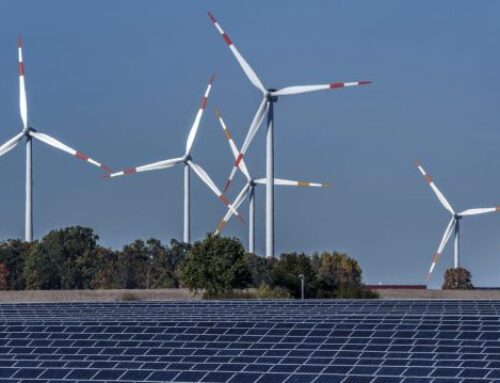Republicans present plans to gut US support for clean energy
May 12, 2025

Republicans have outlined far-reaching plans to gut government support for clean energy as part of a series of legislative proposals to fund sweeping tax cuts promised by US President Donald Trump.
Congressional lawmakers on the powerful House ways and means committee, which is responsible for writing tax law, on Monday released draft legislation that would end renewable energy subsidies and scrap tax breaks for electric vehicle purchases.
The draft bill provided a first glimpse of Republican plans to reshape the US tax code, including doing away with some levies on tips and overtime and cementing lower income tax rates introduced during Trump’s first term.
“This bill delivers on what Americans voted for with President Trump’s promise to put America First,” said Jason Smith, chair of the ways and means committee. “[It] ends special interest giveaways and will hold the woke elite and entities that benefit from the tax code accountable.”
The plans will be at the heart of the omnibus “Big Beautiful Bill” that Trump hopes to jam through Congress to enact his legislative agenda and secure his legacy ahead of fraught midterm elections next year.
The legislation’s assault on green energy tax credits — aimed at unpicking former president Joe Biden’s flagship climate legislation, the Inflation Reduction Act — drew the ire of Democrats and renewable energy bosses, who said it would hammer workers.
Senator Catherine Cortez Masto of Nevada said the tax credit cuts would “destroy jobs and kill innovation”.
“Switching things overnight is not something that any industry can manage,” said Chris Hopper, chief executive of Aurora Solar. “So in the worst case, it’ll certainly be huge employment loss and waves of bankruptcies.”
The bill would scrap a $7,500 tax credit for buyers of EVs after 2026 and a $4,000 credit for second-hand EVs from the end of this year. It would wind down tax credits for most renewable energy investment and production by 2031, rather than tying their expiry to emissions goals.
Monday’s proposals mark Republicans’ most significant effort yet to do away with Biden-era federal clean energy subsidies, which Trump has dubbed the “green new scam”, and follows plans released over the weekend to defund an energy department loan scheme and a grant programme for fighting climate change.
The legislation would also restrict the availability of tax credits to foreign entities, a move designed to target Chinese-backed solar groups.
However, the legislation provided multiple years to wind down some of the federal tax credits — a concession to Republicans whose districts rely on subsidies provided by the IRA. The concession drew sharp criticism from some party hardliners.
“Does the bill fully repeal the IRA to stop the devastatingly bad projects being implemented in my district (battery, solar farms, etc..) — NO, it phases those out, which will cause a race to construction (among other problems), and leaves many in place we should not,” Texas congressman Chip Roy wrote on X. He demanded “SIGNIFICANT additional changes to garner my support”.
The bill would also raise the cap on the amount of local levies taxpayers could deduct from their federal tax bill from $10,000 to $30,000. That was a measure sought by Republicans in high-tax Democratic states such as New York and California.
“[The bill] won’t satisfy everybody,” said Rohit Kumar, national tax office co-leader at PwC US. “But I can see how they seem to have tried to find the very narrow piece of terrain where the Venn diagrams overlapped amongst the various factions within the conference.”
The draft bill will face scrutiny by the members of the ways and means committee on Tuesday before being debated by the wider House of Representatives.
Republicans hold a slim majority in both chambers of Congress and hope to push the changes through the Senate with a simple majority, rather than the 60 votes needed for non-budgetary laws.
Search
RECENT PRESS RELEASES
Related Post



